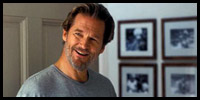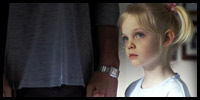
 |
|
The Door In The Floor (2004) Cast: Jeff Bridges, Kim Basinger, Jon Foster, Elle Fanning, Bijou Phillips, Mimi Rogers, Larry Pine, John Rothman, Harvey Loomis, Louis Arcella, Claire Beckman, LeAnna Croom, Kristina Valada-Viars, Donna Murphy, Amanda Posner 2004 – 110 minutes Rated: Reviewed by Dustin Putman, July 16, 2004.  "The Door in the Floor" is a psychological drama about the unraveling of a marriage following the deaths of a couple's two teenage sons. It is also a coming-of-age story about a teenage boy who walks into their lives and unwittingly changes both of them, for better or worse. While these interconnecting storylines present considerable potential, writer-director Tod Williams (1999's "The Adventures of Sebastian Cole") doesn't know the first thing about satisfactorily developing characters and relationships. Worse yet, Williams is clueless when it comes to capturing the truths of human nature, and presenting them so that the characters' actions are both logical and accessible to viewers. And amidst all of the bleak seriousness are scenes of over-the-top farcical comedy, each one of them as out of place as a pig in a chicken coop.
"The Door in the Floor" is a psychological drama about the unraveling of a marriage following the deaths of a couple's two teenage sons. It is also a coming-of-age story about a teenage boy who walks into their lives and unwittingly changes both of them, for better or worse. While these interconnecting storylines present considerable potential, writer-director Tod Williams (1999's "The Adventures of Sebastian Cole") doesn't know the first thing about satisfactorily developing characters and relationships. Worse yet, Williams is clueless when it comes to capturing the truths of human nature, and presenting them so that the characters' actions are both logical and accessible to viewers. And amidst all of the bleak seriousness are scenes of over-the-top farcical comedy, each one of them as out of place as a pig in a chicken coop.
 When 16-year-old aspiring writer Eddie O'Hare (Jon Foster) comes to stay with and work for children's author Ted Cole (Jeff Bridges) for the summer, he is unprepared for what he finds. Ted and wife Marion (Kim Basinger) have recently separated, alternating their time between their luxurious Hampton home and an apartment in town as they half-heartedly care for their perpetually curious 4-year-old daughter, Ruth (Elle Fanning). On the side, Ted paints nude drawings of various women, including the middle-aged Evelyn Vaughn (Mimi Rogers), using Eddie as his chauffeur to get around. Meanwhile, Marion catches Eddie masturbating one day to her bra and panties, finds herself attracted to the idea of being desired again, and promptly starts a none-too-secret affair with the virginal teen. There is even more trouble with the Cole's than meets the eye, however, stemming from the unexpected deaths of their two sons several years before, and Eddie is about to get caught in the middle.
When 16-year-old aspiring writer Eddie O'Hare (Jon Foster) comes to stay with and work for children's author Ted Cole (Jeff Bridges) for the summer, he is unprepared for what he finds. Ted and wife Marion (Kim Basinger) have recently separated, alternating their time between their luxurious Hampton home and an apartment in town as they half-heartedly care for their perpetually curious 4-year-old daughter, Ruth (Elle Fanning). On the side, Ted paints nude drawings of various women, including the middle-aged Evelyn Vaughn (Mimi Rogers), using Eddie as his chauffeur to get around. Meanwhile, Marion catches Eddie masturbating one day to her bra and panties, finds herself attracted to the idea of being desired again, and promptly starts a none-too-secret affair with the virginal teen. There is even more trouble with the Cole's than meets the eye, however, stemming from the unexpected deaths of their two sons several years before, and Eddie is about to get caught in the middle.
 Based on the first-third of John Irving's sprawling novel, "A Widow for One Year," "The Door in the Floor" aspires to accomplish many things at once, weaving a tapestry about the deterioration of a couple and the ways in which loss and regret are dealt with, but it does none of it well. The film's biggest problem is that the characters haven't been fully thought out or conceived, and the choices they make seem senseless and, therefore, rather spineless. Ted, a functioning alcoholic, is thoroughly unpleasant to just about everyone but Ruth, putting down those around him in subtle ways that make his condescension all the more hurtful, and taking advantage of Eddie for unclear reasons. Marion is more or less dead inside until Eddie enters her life; so depressed is she that one almost expects her to commit suicide at any minute. She is outwardly nicer than Ted, but so thoroughly uninterested in being a parent to Ruth that she would rather not be in her life at all. A particular choice she makes in the final act involving the family pictures is unforgivable, the final straw of a character that might have otherwise had some sympathetic shadings. And as for teenage Eddie, the story is primarily told through his eyes, but said eyes are difficult to read. Eddie is a hopelessly static creation, and whatever he learns by film's end is never revealed to the viewer.
Based on the first-third of John Irving's sprawling novel, "A Widow for One Year," "The Door in the Floor" aspires to accomplish many things at once, weaving a tapestry about the deterioration of a couple and the ways in which loss and regret are dealt with, but it does none of it well. The film's biggest problem is that the characters haven't been fully thought out or conceived, and the choices they make seem senseless and, therefore, rather spineless. Ted, a functioning alcoholic, is thoroughly unpleasant to just about everyone but Ruth, putting down those around him in subtle ways that make his condescension all the more hurtful, and taking advantage of Eddie for unclear reasons. Marion is more or less dead inside until Eddie enters her life; so depressed is she that one almost expects her to commit suicide at any minute. She is outwardly nicer than Ted, but so thoroughly uninterested in being a parent to Ruth that she would rather not be in her life at all. A particular choice she makes in the final act involving the family pictures is unforgivable, the final straw of a character that might have otherwise had some sympathetic shadings. And as for teenage Eddie, the story is primarily told through his eyes, but said eyes are difficult to read. Eddie is a hopelessly static creation, and whatever he learns by film's end is never revealed to the viewer.
 Writer-director Tod Williams' study on loss and the plight of his three central characters aren't quite as emphatic as he wants them to be because he fails to make them into characters even remotely deserving of being cared about. Ted and Marion share only a handful of scenes together, not enough to get a sense of how they truly feel about each other or how their marriage might have been in the past. As for the matter of losing one's children, only sparse hints are given about how life was for Ted, Marion, and their sons before tragedy hit, and while there are effective individual moments of grief that feel real, the rest is misguided and opts not to deal with it at all. For a similar motion picture, 2002's "Moonlight Mile" is uncountably superior and more accurate. That lovely film, for one, knew how to elicit natural humor and human emotions out of dark subject matter. In comparison, "The Door in the Floor" is disastrous in its embarrassing attempts at screwball comedy; none of it works, none of it is necessary, and the unfunny shtick clangs loudly in between sequences that are supposed to be dramatic and resonant.
Writer-director Tod Williams' study on loss and the plight of his three central characters aren't quite as emphatic as he wants them to be because he fails to make them into characters even remotely deserving of being cared about. Ted and Marion share only a handful of scenes together, not enough to get a sense of how they truly feel about each other or how their marriage might have been in the past. As for the matter of losing one's children, only sparse hints are given about how life was for Ted, Marion, and their sons before tragedy hit, and while there are effective individual moments of grief that feel real, the rest is misguided and opts not to deal with it at all. For a similar motion picture, 2002's "Moonlight Mile" is uncountably superior and more accurate. That lovely film, for one, knew how to elicit natural humor and human emotions out of dark subject matter. In comparison, "The Door in the Floor" is disastrous in its embarrassing attempts at screwball comedy; none of it works, none of it is necessary, and the unfunny shtick clangs loudly in between sequences that are supposed to be dramatic and resonant.
 The cast is a uniformly excellent one, but the actors find varying degrees of success. Jeff Bridges (2003's "Seabiscuit") is conniving in a slyly understated way as Ted Cole. Concentrating on his facial expressions throughout and nothing else, the viewer would think Ted is a nice guy; listening to the words he speaks and the way he carries himself around others, his true colors show. As the devastated, but still irresponsible, Marion, Kim Basinger (2002's "8 Mile") delivers the film's strongest turn. Until the wrongheaded, confusing action she takes at the end, Basinger poignantly burrows herself into the helpless state of a woman who believes she has lost everything that matters, and doesn't want what she has left (namely, her husband and daughter). Disappointingly, the payoff of her character is inadequate. As the ambitious, quiet Eddie, Jon Foster (2001's "Life as a House") holds up his end against veterans Bridges and Basinger, but struggles to find depth in a flat character that, despite having the most screen time, changes the least of anyone. In smaller parts, young Elle Fanning (2003's "Daddy Day Care") has some work to do before she matches her borderline-genius actress sister, Dakota, but is pretty sharp, all the same, as daughter Ruth; Bijou Phillips (2000's "Almost Famous") is memorably honest in her fleeting moments as Ruth's unsuspecting nanny; and Mimi Rogers (2003's "Dumb and Dumberer: When Harry Met Lloyd") courageously bares all for no reason in the hateful, thankless role of one of Ted's painting subjects.
The cast is a uniformly excellent one, but the actors find varying degrees of success. Jeff Bridges (2003's "Seabiscuit") is conniving in a slyly understated way as Ted Cole. Concentrating on his facial expressions throughout and nothing else, the viewer would think Ted is a nice guy; listening to the words he speaks and the way he carries himself around others, his true colors show. As the devastated, but still irresponsible, Marion, Kim Basinger (2002's "8 Mile") delivers the film's strongest turn. Until the wrongheaded, confusing action she takes at the end, Basinger poignantly burrows herself into the helpless state of a woman who believes she has lost everything that matters, and doesn't want what she has left (namely, her husband and daughter). Disappointingly, the payoff of her character is inadequate. As the ambitious, quiet Eddie, Jon Foster (2001's "Life as a House") holds up his end against veterans Bridges and Basinger, but struggles to find depth in a flat character that, despite having the most screen time, changes the least of anyone. In smaller parts, young Elle Fanning (2003's "Daddy Day Care") has some work to do before she matches her borderline-genius actress sister, Dakota, but is pretty sharp, all the same, as daughter Ruth; Bijou Phillips (2000's "Almost Famous") is memorably honest in her fleeting moments as Ruth's unsuspecting nanny; and Mimi Rogers (2003's "Dumb and Dumberer: When Harry Met Lloyd") courageously bares all for no reason in the hateful, thankless role of one of Ted's painting subjects.
 There are good scenes in "The Door in the Floor" that take their time and unfold to cogent effect, but that is where its successes are cut short. The music score by Terry Stacey (1999's "Trick") is plainly intrusive, hammering home the emotion of each moment to the point where it takes you out of the story . The film is aimless and unknowledgeable, so stubborn not to wrap anything up that it could end at any time in the last fifteen minutes and would be no more worse off. And that is when the real ending arrives. The final shot, meant to be an ironic surprise, is frustratingly confounding and too cute by a half . If it is supposed to carry extra purpose or symbolism, that meaning is lost in Tod Williams' murky filmmaking. "The Door in the Floor" is unfocused beyond repair.
There are good scenes in "The Door in the Floor" that take their time and unfold to cogent effect, but that is where its successes are cut short. The music score by Terry Stacey (1999's "Trick") is plainly intrusive, hammering home the emotion of each moment to the point where it takes you out of the story . The film is aimless and unknowledgeable, so stubborn not to wrap anything up that it could end at any time in the last fifteen minutes and would be no more worse off. And that is when the real ending arrives. The final shot, meant to be an ironic surprise, is frustratingly confounding and too cute by a half . If it is supposed to carry extra purpose or symbolism, that meaning is lost in Tod Williams' murky filmmaking. "The Door in the Floor" is unfocused beyond repair.
|
© 2004 by Dustin Putman |














